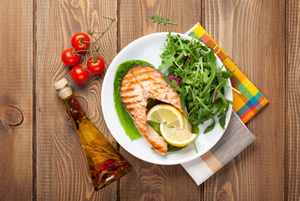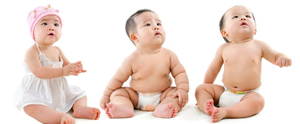Can Diet Improve Fertility?

One of the most common questions we are asked by patients is whether they can change their diet or add supplements to improve their chances of conceiving. The answer is complex and largely depends on the individual's lifestyle, but the short version is that improving your overall health and lifestyle should have a positive effect on your fertility. However, if you already have a good diet, exercise regularly, and are not overweight these changes are likely to only have a limited impact.
One of the times when diet can make the biggest impact on your fertility is when you are actively trying to conceive (rather than preparing for treatment). Here is a guide to help you maximise your chances of successful pregnancy.
What to Eat When Trying to Conceive
As a very broad rule, it is best to eat plenty of fruit and vegetables (variety is as important as volume to ensure that you get all of the nutrients you need) and to avoid processed foods as much as possible. We also recommend steering clear of alcohol and large amounts of caffeine. Beyond this, your requirements change throughout the month according to your menstrual cycle.
During Menstruation
It's tempting to reach for junk or comfort food during menstruation, especially if you're particularly prone to bloating, painful cramps, or feeling lethargic. The trick to feeling less tired or drained during your period is to increase the amount of iron-rich foods that you eat – the nutrient is incredibly important throughout pregnancy and the blood loss has an impact on iron levels for many women. Rather than focusing on cheese burgers, try to get more unprocessed meat, beans, fish, leafy greens, and seeds. Some of these also have anti-inflammatory properties, which will help with both bloating and cramps while giving you an energy boost.
Vitamin C is also important during this time, so try to incorporate more bell peppers, tomatoes, broccoli, kiwi, and citrus fruits into your diet. This will help you to absorb the additional iron you're eating.
It's important not to be discouraged by a failed cycle and disrupt your good diet during menstruation – try to view this period as priming your body for the next conception attempt.
Ideal dinner: Steak with roasted peppers, onions, and tomatoes, and a sharp fruit salad for dessert.
Pre-Ovulation
In between your period and ovulation, your body is working to develop a dominant follicle and your oestrogen levels are rising – this is called the follicular phase. If you have a condition such as fibroids or endometriosis, you may find this week difficult due to too much oestrogen – eating vegetables such as broccoli, kale, cabbage, and cauliflower will boost your di-indolylmethane (DIM) levels and help you to metabolize the excess oestrogen.
Try to incorporate more olive oil, avocado, nuts, seeds, and leafy greens into your diet as well to increase your Vitamin E intake. This vitamin is found in the fluid of your follicle that houses the egg, so will ensure that it's as healthy as possible.
Ideal dinner: grilled chicken breast with avocado and leaf salad.
Ovulation
When you're nearing ovulation, you will need to eat vitamins and nutrients that help to release the egg and promote good implantation. You should focus on eating more B vitamins, Vitamin C, and zinc. Ideal foods include oily fish (but try to limit your tuna intake due to mercury content), leafy greens, eggs, legumes, meat, and plenty of water. Staying well-hydrated thins out your cervical mucus to make it easier for sperm to reach the egg.
Ideal dinner: grilled salmon topped with an egg, brown rice, and greens sautéed in olive oil.
Post-Ovulation
During this stage of your cycle, the focus is on a diet that encourages cell growth. It is called the luteal phase, and beta-carotene is one of the most important nutrients to add to your diet now. Eating plenty of carrots, sweet potatoes, and leafy greens should help to prevent early miscarriage.
Pineapple is a perfect food for this part of your cycle – it contains beta-carotene and bromelain, which can help to reduce inflammation and help implantation.
Finally, try to get more warm foods rather than salads or chilled soups, since higher temperatures will also help you hold the pregnancy.
Ideal dinner: sweet potato chilli with brown rice and sliced pineapple for dessert.
Conception Supplements vs. Nutrition
If you do not have time or the cooking abilities to overhaul your diet, it's tempting to look at simpler solutions such as supplements. Unfortunately, it is agreed that it's best to get your vitamins naturally from food or sun exposure (in the case of vitamin D) rather than supplements. This is to do with how you metabolise the pills, dosage, and what you will be leaving in your diet. For example, taking iron supplements and vitamins is all well, but if you are still eating a lot of salt, processed foods, and not eating enough vegetables you have not improved your chances of pregnancy as much. Supplements also focus on particular nutrients or vitamins, while healthy food contains a huge variety of nutrients that all contribute towards maintaining a healthy body for you and your future baby.
Some supplements are actively discouraged, such as bromelain which could be harmful to a pregnancy in large amounts.
The exceptions to this rule are vitamins B-12 (to help iron absorption) and B-9 (Folic Acid). Absorption of these vitamins is up to 70% better from supplements, so pregnant women or women intending to conceive are encouraged to take these supplements regardless of diet. These are especially important for vegetarian women, as iron from plants is not absorbed as well as from meat.
By Kamal Ojha, MD FRCOG
Medical Director, Concept Fertility Clinic
The next Concept Fertility free fertility advice sessions are on 24 June, 15 July, 19 Aug, 16 Sept, 14 Oct, 11 Nov and 9 Dec. To book at place or for more information call 020 3388 3000 or visit the website. www.conceptfertility.co.uk.
Advertisement
August 29, 2017
Related links
|

